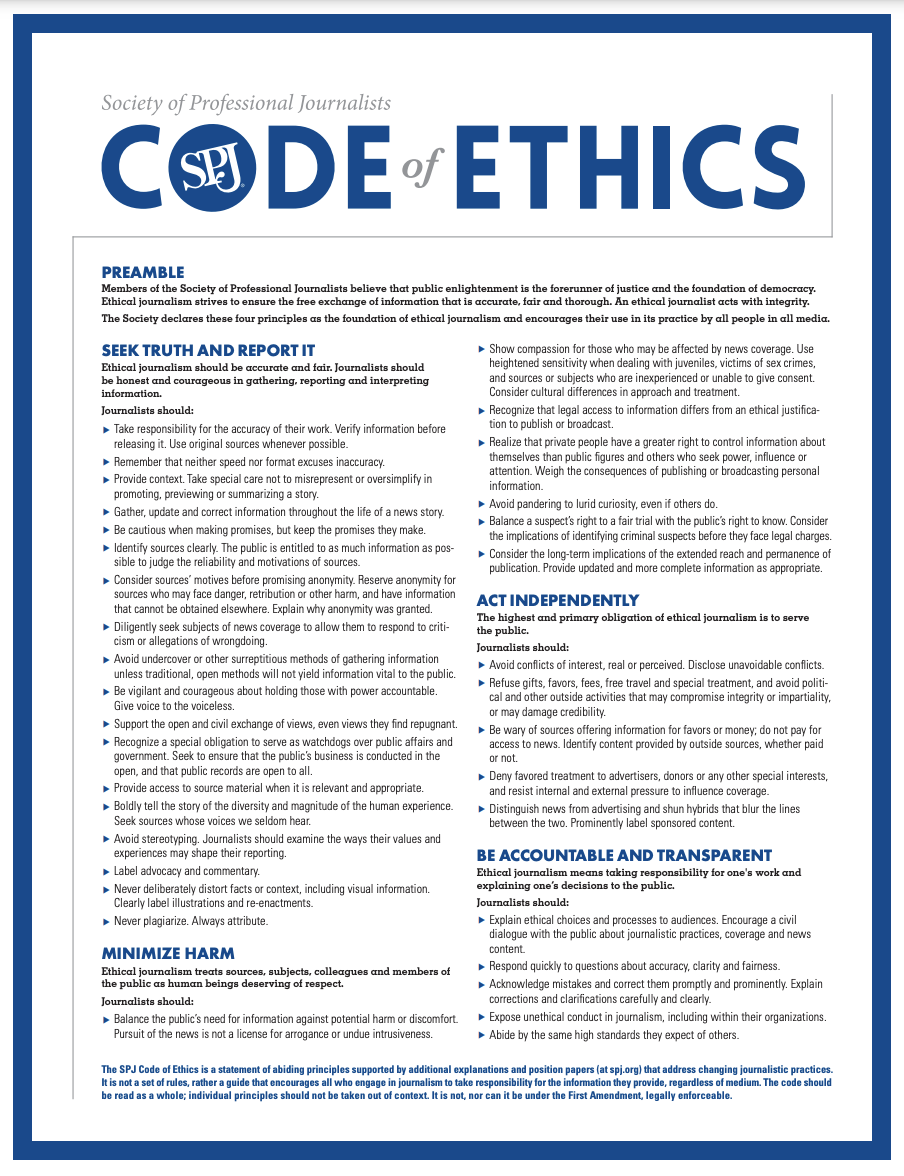How to be an Ethical Journalist
Journalists have a responsibility to report news accurately, fairly, and ethically. When in school studying journalism, ethics are at the forefront of many classes and should be thought about everyday when working professionally. While the temptation to gain popularity and views may be strong, it is crucial for journalists to stick to ethical guidelines to maintain their credibility.
In order to keep journalists on the right path, there is a code of ethics that is used as guidelines. Here you can see the code from the Society of Professional Journalists. It is the means of which reporters and news outlets live by.
Let’s break down what these rules mean.
1. Seek the Truth and Report it
The primary goal of journalism is to inform the public and give them accurate and reliable information. Journalists have the responsibility to find the truth and report it as is. This means verifying facts from multiple parties, checking sources, and avoiding bias.
2. Minimize Harm
Journalism has the power to influence public opinion and shape policies. It is important for journalists to be aware of the potential impact of their work on individuals and communities. They should balance the public’s right to know over the possibility of harm. They should also avoid notions that would create violence, spread hate speech, or stereotype.
3. Act Independently
Reporters have a lot of power in their day to day roles. They are entrusted to tell stories that involve people from across the world, but they must maintain independence and avoid conflicts of interest that could compromise their integrity. They must resist pressure from sources or advertisers to stay unbiased in their reporting. This means they cannot accept gifts or favors for any reason, especially as a bribe to portray a person or story in a certain way.
4. Be Accountable and Transparent
Journalists, just like all humans, are not perfect. Although their job is to tell the truth, mistakes can happen. When they do, reporters must take responsibility for their errors and issue corrections when necessary. They should be able to learn from mistakes and strive to improve.
Transparency is essential in maintaining trust with an audience. Journalists must share any conflicts of interest, biases, or potential influences that may affect their reporting. They should be open about their sources and methods. Transparency also relates to exposing unethical behavior, even if it is being done within their own organizations.
Outside of the SPJ guidelines, there are other ethical considerations journalists should keep in mind.
5. Be Fair and Balanced
It is crucial for journalists to give balanced and unbiased answers in their reporting. In an article, journalist Bob Woodward says they should give their audience all sides of a story and share different perspectives. For example, journalists should speak to both political parties about an issue and include both those reactions in their story.
6. Respect Privacy
While it is critical for journalists to break news to their communities, they must also have a level of respect for others. They should not publish information that may hurt or embarrass someone without a reason and must have consent to use other people’s personal information or pictures. This also relates to journalists who seek out individuals to use in their coverage. If someone does not want to talk to the media, that decision should be respected.
7. Avoid Sensationalism
Sensationalism is the use of exciting or shocking stories or language to gain public interest despite the content being accurate. This is brought up on social media often with “clickbaiting,” which should not be used by journalists, despite their desires to gain traction in their stories. These flashy titles or words can mislead the public. That’s why journalists must not exaggerate or change details to create a more compelling story. They should stick to the facts and present them accurately.
Ethical journalism requires reporters to focus on the truth and what is fair. By following these guidelines, they can build a reputation as a reliable source of news. Social media has blasted “fake news” and misinformation, which is why ethical reporting is more necessary than ever. Journalists have a strong responsibility to serve the public and share the truth while taking all these ethics into consideration.


